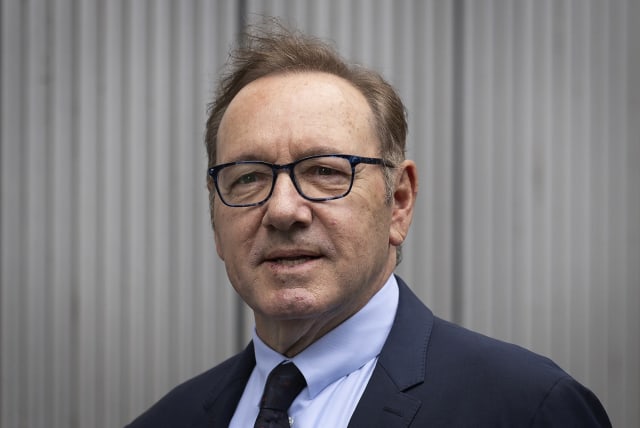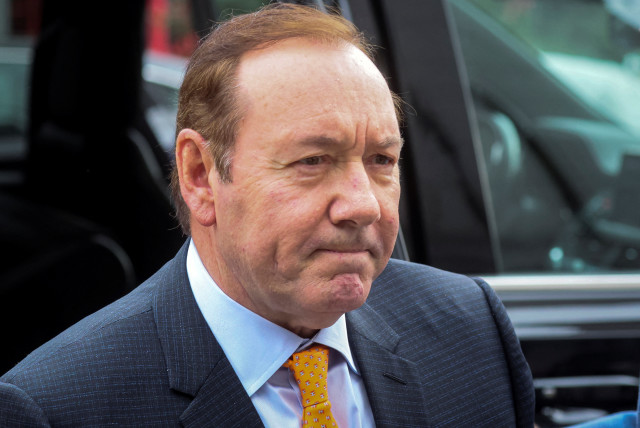Kevin Spacey should not be uncanceled - opinion

For six long years, the highly acclaimed and once beloved Spacey has given fans, colleagues, media outlets, artistic institutions, the LGBTQ community, and the culture at large a lot to process.
Last week, after being acquitted of nine counts of sexual assault and indecent assault, Kevin Spacey opened his brief remarks to the press by saying, “I imagine that many of you can understand that there’s a lot for me to process after what has just happened today.”
Yes, we certainly can. Since 2017 we’ve been watching the fall of Kevin Spacey unfold; more than 30 men accused Spacey of sexual assault or inappropriate behavior – to which the actor responded by coming out as gay then retreating for “evaluation and treatment,” eventually denying all allegations and occasionally posting truly creepy Christmas videos.
For six long years, the highly acclaimed and once beloved Spacey has given fans, colleagues, media outlets, artistic institutions, the LGBTQ community, and the culture at large a lot to process, none of it good.
Now we’re back for Round 156: Having been acquitted, should Kevin Spacey be uncanceled?
One can deride the ubiquity and accuracy of the term “canceled,” but there is no denying that it applies to Spacey. Even at the height of #MeToo, no one fell as hard and fast as he did, going from beloved A-lister to Hollywood pariah in a matter of weeks.
In 2017, the two-time Oscar winner was riding high as the star of Netflix’s House of Cards and an enthusiastic evangelist for the streamer. Then, that October, actor Anthony Rapp accused Spacey of attempting to molest him at a party when Rapp was 14.
Within hours, Spacey responded on social media, saying he had no recollection of the incident, “But if I did behave then as he describes, [I] owe him the sincerest apology for what would have been deeply inappropriate drunken behavior and I am sorry for the feelings he has described carrying with him all these years.”
A “sorry if that happened” apology for the alleged molestation of a 14-year-old was bad enough. But then he went on to come out as gay, something many members of the LGBTQ community had been urging him to do for years.
If he thought that bit of news would supersede the molestation accusation, he was very wrong; whatever support Spacey might have received for coming out was engulfed in outrage over using such a moment to do so.
At his trial last week, Spacey blamed his publicist (when in doubt, blame your publicist!) for encouraging him to respond to Rapp’s accusation, though he conceded, through tears, that it had been his decision to put out that specific statement and “I have to own that.”
He certainly does, since it foreshadowed a strangely cavalier “Hey guys, it’s me” attitude toward the subsequent cascade of accusations against him, culminating in Spacey claiming that he’s just “a big flirt” during the UK trial.
Three men had accused him of unwanted touching and crotch-grabbing, and a fourth claimed that Spacey had performed unwanted oral sex on him while he was sleeping.
Of the groping charges, Spacey testified that he had a somewhat sexual relationship with one of the accusers but denied his charge of crotch-grabbing, dismissed another as simply untrue and characterized the third as “a clumsy pass.”
As for the more serious charge, he testified that he and the man had consensual sex in Spacey’s apartment, though the man seemed “uncomfortable” when he left.
While the men described him as “slippery” and “vile,” Spacey characterized himself as “a flirt” whose gentle touches were being mischaracterized in a way that baffled him.
Indeed, his defense rested on the argument that being promiscuous is not the same as being predatory.
Which it absolutely is not. But considering the similarity of so many of the accusations leveled against Spacey – crotches grabbed, aggressively inappropriate comments – in this trial and in general, it’s tough not to wonder who exactly should decide what is “promiscuous” and what is “predatory.”
The person initiating the actions or the person on the receiving end?
The jury, many of whom hung back for a meet-and-greet with the actor, went with Spacey’s version.
And though their verdict is a win for the actor, it’s a legal win, not a moral one. Having your actions judged noncriminal does not mean they were not hurtful.
#MeToo may have heightened our awareness of the many forms of sexual harassment and assault, but we still do not know how to grapple with behavior that is open to such conflicting interpretations.
“I was just flirting, I didn’t mean to hurt/scare/intimidate you” allows the perpetrator to define the terms of the encounter, putting the onus on the person who says they experienced hurt, fear, and intimidation.
But Spacey’s cancellation was not sparked by the accusations made in the UK. And though Spacey’s “enough about you, let’s talk about me” response to Rapp’s accusation set everyone’s teeth on edge, it wasn’t that either.
It was everything that happened in between.
Within a week of Rapp’s accusation, more than a dozen other men came forward with accusations of sexual assault and inappropriate behavior. Some, including Richard Dreyfuss’ son Harry, alleged behavior that had occurred when Spacey was an adult and they were teenagers.
Production on House of Cards halted, and in early November, CNN reported that multiple crew members had accused Spacey of sexual harassment and, in one case, sexual assault. Netflix cut ties with its most fervent spokesman.
Meanwhile, London’s Old Vic theater, of which Spacey had been artistic director from 2003 to 2015, reported 20 allegations of inappropriate behavior. The same month, in an unheard of move, Ridley Scott announced that Spacey’s performance as J. Paul Getty in All the Money in the World would be scrubbed, replaced by scenes shot with Christopher Plummer.
In early December, Netflix announced that the final season of House of Cards would proceed without Spacey; when the season opened, his character, Frank Underwood, had been killed.
Having botched his initial public statement, Spacey retreated, but after House of Cards proceeded without him, he appeared to push back in a very weird way even as he faced multiple civil and criminal cases.
In 2018, shortly after being charged in Nantucket with felony sexual assault, Spacey dropped a bizarre video through his Twitter account. Called “Let Me Be Frank,” it featured Spacey as his House of Cards character baiting the audience with lines like “don’t rush to judgment” and “you want me back.” (He pleaded not guilty to the Nantucket charges, and in 2019 they were dropped due to “the unavailability of the plaintiff.” ) The following December, another video appeared in which Spacey’s Frank, in a Christmas sweater, counseled the viewer to, among other things, kill enemies with kindness.
Ultimately, a jury found Spacey not liable in Rapp’s civil suit over the molestation allegation; in a separate action, however, the actor was ordered to pay House of Cards production company MRC $31 million for breaching his contract by violating the company’s sexual harassment policy.
So where does he, and where do we, go from here?
In the hours following the verdict, many speculated on the possibility of Spacey returning to work, in Hollywood or theater. During his years in exile and litigation, Spacey has worked on a few independent projects and said, this week, that there were several deals in the works, dependent on a not-guilty verdict.
Gene Fallaize, who recently directed Control, in which Spacey voiced a character, said he was surprised by how much support he got when, before the UK trial took place, he announced the casting. “We did anticipate a lot of negativity,” Fallaize recently told Variety. “What we didn’t expect was the wave of positivity from his fan base. He has got an extremely, aggressively positive fan base.”
So do a lot of people. But does an “aggressively positive fan base” mean Spacey could, or should, star in a major film or television series?
Some would say he had his day in court and should be able to move on.
But cancellation isn’t a legal finding, it’s a public-relations phenomenon. Could audiences possibly watch another of Spacey’s signature bad guys, or even good guys, without all the accusations, criminal charges, and lawsuits (not to mention those bizarre “Let Me Be Frank” videos) piling up between the actor and his character?
Spacey has said he believes his work will stand the test of time, and that may be true, although after the verdict was announced, his final scene from The Usual Suspects was all over social media, and not in a complimentary way.
He is, undeniably, a fine actor with an elasticity that allowed him to champion both the Old Vic and Netflix in almost the same breath. No doubt other film or television makers will feel, as Fallaize did, that Spacey is worth the risk.
But if his past performances manage to rise from the shadows of scandal, it’s difficult to imagine him reviving his career, at least in the US, any time soon. His fall was epic and, frankly, exhausting; it would take a solid group of A-list supporters to bring him back into the fold. Thus far, they have not shown themselves.
In any case, he won’t be doing much for a while – as a member of SAG, he is on strike.
Until that’s resolved, we really don’t have to think about him at all. And won’t that be nice.
The writer is a culture columnist and critic for ‘The Los Angeles Times.’
Jerusalem Post Store
`; document.getElementById("linkPremium").innerHTML = cont; var divWithLink = document.getElementById("premium-link"); if (divWithLink !== null && divWithLink !== 'undefined') { divWithLink.style.border = "solid 1px #cb0f3e"; divWithLink.style.textAlign = "center"; divWithLink.style.marginBottom = "15px"; divWithLink.style.marginTop = "15px"; divWithLink.style.width = "100%"; divWithLink.style.backgroundColor = "#122952"; divWithLink.style.color = "#ffffff"; divWithLink.style.lineHeight = "1.5"; } } (function (v, i) { });

